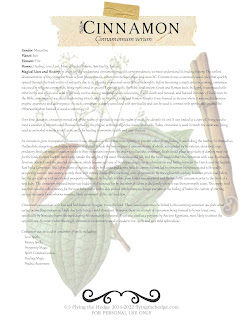Planet: Sun
Element: Fire
Powers: Healing, Love, Lust, Money, Psychic Powers, Spirituality, Success
Magical Uses and History: In order to fully understand cinnamon's magical correspondences, we must understand its trading history. The earliest documentation of the cinnamon trade is from Mesopotamia, somewhere between 8000 and 2000 BC. Cinnamon was a commonly used spice that quickly spread through the trade routes of antiquity due to its pleasing aroma and versatile health benefits. Before becoming a staple spice in cooking, cinnamon was used in religious ceremonies, being mentioned in ancient Egyptian texts, the Bible, and ancient Greek and Roman texts. In Egypt, it was mixed with other herbs and spices and used to fill body cavities during mummification, associating it with death and renewal, and burned in honor of loved ones. In the Bible, cinnamon oil was used in anointing rituals, while in Ancient Greek and Roman temples it was burned as incense where it was used to increase psychic awareness and clairvoyance. As such, cinnamon is deeply associated with spirituality and can be used to connect with spirits, deities, and the Otherworld when burned or used as anointing oil.
Over time, however, cinnamon moved out of the realm of spirituality into the realm of medicine, despite its cost. It was touted as a cure-all, being used to treat a number of ailments and illnesses including the plague, arthritis, digestive issues, and colds. Today, cinnamon is used in much the same way, being used as an herbal remedy as well as in spells for healing to promote health and cure diseases.
As cinnamon grew in popularity, however, it was shrouded in more and more mystery to prevent others from finding it and taking the market for themselves. Outlandish, dangerous, and vague stories were created to hide the true origins of cinnamon, one of which, as recorded by Herodotus, described large predatory birds carrying cinnamon sticks to their mountain top nests. In order to collect the cinnamon, locals would place large slabs of donkey meat out for the birds to carry back to their nests. Under the weight of the meat, the nests would fall, and the locals could collect the cinnamon with ease. Eventually, however, others found the coveted cinnamon, which became just one of the spices caught up in colonization and battles between the Dutch and the English East India Companies that left millions of natives dead in Sri Lanka and across Asia. Its expensive cost led to cinnamon being associated with wealth, prosperity, success, and money, as only those with money could afford the rising costs of cinnamon. By the eighteenth century, however, prices had fallen, but the association with wealth and prosperity remained. In English folklore, rum butter was prepared and flavored with cinnamon prior to the birth of a new baby. The cinnamon-infused butter was hidden and searched for by the other children in the family where it was then promptly eaten. The empty bowl was then used to collect money for the new baby over a twelve-day period. While many no longer partake in the hiding of butter, the custom of starting savings accounts for newborns remains, likely a remnant of this old tradition.
Cinnamon's association with love and lust, however, is vague, to say the least. These associations may be linked to the warming sensation one feels when eating or smelling cinnamon, likely due to its being a mild stimulant. However, there are records of cinnamon being burned to honor loved ones, specifically by Nero who burnt the bark during his second wife's funeral. It was also used as a perfume by Ancient Egyptians, most likely to attract the opposite sex. No matter what the origin, cinnamon is commonly used in modern love spells and as a mild aphrodisiac.
Cinnamon can be used in a number of spells including:
Love Spells
Money Spells
Prosperity Magic
Spirit Communication
Healing Magic
Psychic Awareness
Medicinal Uses: Cinnamon bark is most often used as a carminative addition to other herbs to help relieve nausea, vomiting, bloating, and indigestion. As a mild stimulant, it is also used to speed recovery, especially those related to gastrointestinal upsets, increase alertness, strengthen blood flow, and reduce blood sugar. It's also a mild astringent and therefore can be used to treat mild diarrhea and stomach ulcers caused by Helicobacter pylori. Cinnamon is also used to treat mild colds, flu, and coughs.
Preparation and Dosage: Internally, cinnamon back can be taken as an infusion and is usually added to other herbs such as peppermint, basil, or rooibos tea, but can be taken on its own. Combine 1-2 sticks with boiling water and infuse for 5-10 minutes. Drink up to three times a day. This is best taken before bed to regulate blood sugar. As a cough/cold/flu remedy, combine 1 teaspoon honey with 1/4 teaspoon ground cinnamon and take it up to three times a day.


Want to print a copy of this for your Book of Shadows? Click below for your free copy!
If you liked this post and would like to support future content, please consider leaving a small tip in the jar.



No comments :
Post a Comment
This witch loves to hear from her readers, so please share your thoughts below!